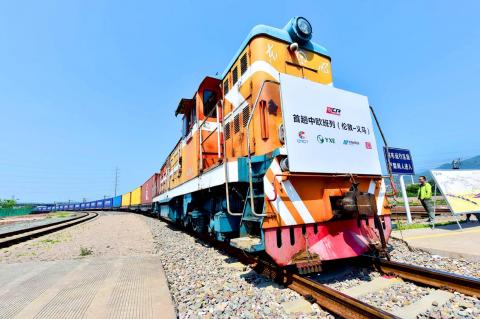Laden with whisky and baby milk, the first freight train linking China directly to the UK arrived in the eastern Chinese city of Yiwu yesterday after a 12,000km trip, becoming the world’s second-longest rail route.
The journey is the latest effort in China’s drive to strengthen trade links with western Europe along a modern-day Silk Road route.
“The train arrived at around 9:30am to Yiwu on Saturday,” Yiwu Tianmeng Industry Co told reporters.

Photo: AFP
The world’s top trading nation launched the “One Belt, One Road” initiative in 2013, and has since poured millions into constructing vast infrastructure links.
The train — which was also carrying pharmaceuticals and machinery — departed London on April 10 and passed through France, Belgium, Germany, Poland, Belarus, Russia and Kazakhstan during its 20-day trip before arriving in Yiwu in eastern Zhejiang Province, a major wholesale center for small consumer goods.
The new route is longer than Russia’s famous Trans-Siberian railway, but about 1,000km shorter than the record-holding China-Madrid link, which opened in 2014.
London is the 15th city to be linked to a new freight network offered by the state-run China Railway Corp, which says its services are cheaper than air transport and quicker than shipping.
The journey should be 30 days faster than moving the goods by ship, the provincial government had said, but the pilot run took two days more than the 18 days expected.
The train, named the East Wind (東風號), has much less carrying capacity — just 88 shipping containers, according to the Yiwu government, compared with the 10,000 to 20,000 containers cargo ships can carry.
It is unclear how much the venture cost and some experts have questioned whether the ambitious project makes economic sense.
“It is hard to say at this stage what the economic return will be, as the economic benefits will come over a long time,” He Tianjie of Oxford Economics Hong Kong told reporters.

Tens of thousands of Filipino Catholics yesterday twirled white cloths and chanted “Viva, viva,” as a centuries-old statue of Jesus Christ was paraded through the streets of Manila in the nation’s biggest annual religious event. The day-long procession began before dawn, with barefoot volunteers pulling the heavy carriage through narrow streets where the devout waited in hopes of touching the icon, believed to hold miraculous powers. Thousands of police were deployed to manage crowds that officials believe could number in the millions by the time the statue reaches its home in central Manila’s Quiapo church around midnight. More than 800 people had sought

DENIAL: Pyongyang said a South Korean drone filmed unspecified areas in a North Korean border town, but Seoul said it did not operate drones on the dates it cited North Korea’s military accused South Korea of flying drones across the border between the nations this week, yesterday warning that the South would face consequences for its “unpardonable hysteria.” Seoul quickly denied the accusation, but the development is likely to further dim prospects for its efforts to restore ties with Pyongyang. North Korean forces used special electronic warfare assets on Sunday to bring down a South Korean drone flying over North Korea’s border town. The drone was equipped with two cameras that filmed unspecified areas, the General Staff of the North Korean People’s Army said in a statement. South Korea infiltrated another drone

COMMUNIST ALIGNMENT: To Lam wants to combine party chief and state presidency roles, with the decision resting on the election of 200 new party delegates next week Communist Party of Vietnam General Secretary To Lam is seeking to combine his party role with the state presidency, officials said, in a move that would align Vietnam’s political structure more closely to China’s, where President Xi Jinping (習近平) heads the party and state. Next week about 1,600 delegates are to gather in Hanoi to commence a week-long communist party congress, held every five years to select new leaders and set policy goals for the single-party state. Lam, 68, bade for both top positions at a party meeting last month, seeking initial party approval ahead of the congress, three people briefed by

Cambodia’s government on Wednesday said that it had arrested and extradited to China a tycoon who has been accused of running a huge online scam operation. The Cambodian Ministry of the Interior said that Prince Holding Group chairman Chen Zhi (陳志) and two other Chinese citizens were arrested and extradited on Tuesday at the request of Chinese authorities. Chen formerly had dual nationality, but his Cambodian citizenship was revoked last month, the ministry said. US prosecutors in October last year brought conspiracy charges against Chen, alleging that he had been the mastermind behind a multinational cyberfraud network, used his other businesses to launder